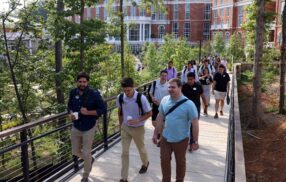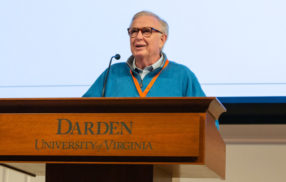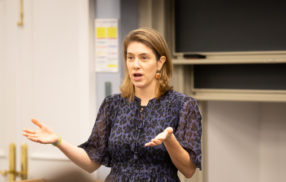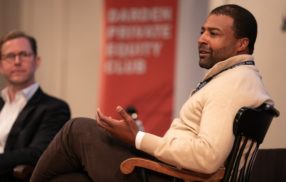
Turnaround Titans: Why Companies Seek Darden Grads to Lead Tough Turnarounds
By Seb Murray
It was not so long ago that everyone knew an Avon lady. In 1886, 34 years before women in the U.S. earned the right to vote, Avon founder David H. McConnell empowered a fleet of those iconic sales representatives to sell their products door to door. They began by selling Little Dot perfume sets in 1886, and by 1902 sold a full range of cosmetics.
Avon became a household name, and the business model worked beautifully. The army of saleswomen took orders from people’s homes, delivered the products to consumers themselves, collected payment and deposited the money to Avon. They received a cut of the sales. The women liked the flexibility to work whenever and wherever convenient.
But like so many things in business and society, times changed. Avon’s door-to-door vendors fell prey to large stores like Walmart, then e-commerce players like Amazon and the rise of dual-career couples — resulting in no one around to answer the doorbell.
These trends broke Avon’s business model. It continuously lowered its selling price to compete with cheap online players, which squeezed profitability. With its salesforce’s paychecks crimped, representatives quit in droves. Avon’s share price tanked from around $35 per share in 2009 to nearly $2 in August 2017. That’s when University of Virginia Darden School of Business alumnus Miguel Fernandez (MBA ’01) joined the Avon leadership team to help lead the company through industry disruption.
“The model that used to be very powerful, through the advancements of technology, was completely upended,” says Fernandez, global president of Avon. “Where do you go from there?”
He is hoping to be the leader behind the salvation of the Avon brand. He’s leading a turnaround strategy that involves focusing on global markets like Brazil and Russia, where door-to-door selling still works because e-commerce is nascent. As part of the strategy, Avon sold off its U.S. operations and moved its headquarters to London.
Fernandez is striving to digitize Avon. It introduced an online brochure that sales representatives can send to customers through WhatsApp messages and plans to create editorial features online. “Back in the day, an Avon lady could visit five or six customers in one afternoon,” he says. “Now with an Instagram post, they can reach hundreds, if not thousands, of people.”
Appealing to digital-savvy millennials — a key target market — is crucial. Avon has updated its image through marketing, including a video advertisement in Brazil featuring transgender models and drag queens.
The secret sauce, though, could be training its sales vendors to be beauty experts, creating tailored product recommendations for consumers in a way that is far more personal than a website algorithm. “Consumers don’t mind paying more if the rep has the expertise,” says Fernandez. “The trick is converting a product seller into a service provider. That’s how we can kill Amazon.”
The ‘Country’s Foremost Turnaround Banker’ Who Reformed Citigroup
Fernandez is just one of many Darden alumni who have led or are leading major strategic shifts amid widespread, rapid disruption.
In fact, one of the largest and most public turnarounds in modern corporate history is widely credited to the leadership of Mike O’Neill (MBA ’74). When O’Neill announced his retirement as chairman of Citigroup in November 2018, The Wall Street Journal hailed him a “Turnaround Titan” for his work transforming the bank following its near-death experience during the global financial crisis.
O’Neill joined Citi as chairman in 2012 “with a reputation as perhaps the country’s foremost turnaround banker, having first earned that status at Continental Illinois National Bank and Trust — at the time, the biggest-ever U.S. bank failure — then at a predecessor of Bank of America Corp., and then as chief executive of Bank of Hawaii Corp.,” the Journal wrote.
During his tenure, O’Neill led the replacement of Citi’s financial crisis-era CEO with current CEO Michael Corbat, eliminated the “bad bank” that housed Citi’s toxic assets, doubled the bank’s value and led it to four straight years without failing the Federal Reserve’s stress test (a test it routinely failed before his arrival).
O’Neill headlined the University of Virginia Investing Conference in November 2018 and told the audience in Darden’s Abbott Auditorium that his imperatives as leader of the board were to centralize and strengthen risk management and recruit board members who were true subject matter experts in areas of the bank’s business.
The Alumna Who Helped Restore Coach’s Luxury Reputation
Venerable handbag and apparel maker Coach Inc. once seemed on the precipice of losing its hard-won cachet, a victim of changing consumer tastes, out-of-step designs and retail saturation in the wrong channels.
Speaking to Darden’s Retail & Luxury Goods Club in late 2018, Coach Divisional Vice President of North America Retail Finance Beth McCann (MBA ’08) discussed the ups and downs of the company’s recent history to its current position of positive sales momentum and expanding product lines.
“We were doing a lot of flash sales in the online outlet channel, and the business had become way too large,” said McCann, who began with Coach when she graduated from Darden. “It was causing a lot of negative brand impression in the marketplace, as though we were a discount brand.”
This caused the subsidiary of parent company Tapestry to stumble, leading to a turnaround effort beginning in 2014 to reclaim Coach’s once lofty premier brand status and sales.
While pulling back on the flash sales channel, the company simultaneously elevated the experience in its retail channel and tightened the reins on certain “silhouettes,” or product models, ensuring they were never offered in a discounted environment. Most importantly, McCann said, Coach continued to evolve into a data and analytics-centric organization.
McCann said during her Darden visit that the Coach brand refresh was working, and results in 2019 back up the claim. The Motley Fool wrote in November 2019 that “Coach remains Tapestry’s core growth engine, with eight straight quarters of positive comps growth buoyed by robust growth across its international and digital channels.”
The Private Equity Pipeline Where Darden Grads Test Their Turnaround Chops
Robert Northrop (MBA ’06) followed a common path among Darden graduates from private equity into a turnaround leadership position. He is a former operating partner at Resilience Capital Partners, which manages more than $750 million in investor funds and currently holds about 20 companies in its investment portfolio. He was named interim CEO of Resilience portfolio company Affinity Apparel, which produces and sells bespoke uniforms to large businesses around the U.S.
An antiquated and inefficient enterprise resource planning system for managing orders meant that Affinity was failing to ship uniforms to its customers on time. This negatively affected the working capital of the business, which meant it was unable to finance its inventory. With uniforms unmade, customers began leaving.
Northrop was brought in to turnaround the struggling business, and his strategy focused on reforming the inventory process. The first step was a tough one — cutting down the workforce to free funds to fix the broken inventory management system.
His first night on the job was, understandably, sleepless. “I was thinking about the responsibility on my shoulders of this business that had a lot of loyal employees,” says Northrop. What helped him keep a cool head was Professor James Clawson’s leadership course, which taught him to be confident in his leadership style.
A Management Communications class from his First Year, meanwhile, prepared him for a massive list of problems on his first day. “The first case we did was an inbox exercise where you come back from vacation at a company as the protagonist, and there’s seven or eight fires in the inbox that you have to deal with,” Northrop says. “Having that reference point was helpful and allowed me to keep my cool.”
Ultimately, the decision to cut the workforce down freed up capital that turned the business around. Northrop says: “It turned around our working capital situation, which allowed us to make additional investment to have the right inventory and fill back orders and ship those products.”
With dozens of Darden grads serving in operating roles within private equity firms, many are faced with difficult situations just like those Northrop encountered at portfolio companies across the world. Gone are the days of financial engineering to turn a quick profit. Today, private equity firms’ profit motives are aligned with enhancing the operations of portfolio companies so they can survive short-term challenges; grow in the long term; and continue providing value for their customers, employees, communities and owners.
How Darden Values Create Value for Turnaround Leaders
Many leaders with reputations as kings and queens of the turnaround cut their teeth at the Darden School and credit their MBAs for the skills and mindset needed to bring a business back from the brink.
Darden gave Avon’s Fernandez a solid grounding in the fundamentals of business, but the real value was less tangible. Through Darden’s case study method, he learned the value of humility.
“In a turnaround, you have people with doubts and different perspectives, sometimes very confrontational viewpoints,” says Fernandez. “What Darden teaches you is to listen and hear both sides of the story. That’s the biggest thing I got out of the MBA.”
He relates the example of when, during the ongoing Avon turnaround, his colleagues wanted to curb sales vendors’ commissions, which rose to 40 percent if they hit certain sales targets. He resisted the pressure, having spoken to the people who originally developed the policy and seeing the rationale behind it.
“When new people come into a firm, their first instinct is to believe that everything done before is wrong and stupid. This is irrational thinking,” Fernandez says.
Darden alumni are well prepared to lead a turnaround, according to Professor Lynn Isabella, who has been on the School’s faculty for 30 years and teaches on leadership, change and culture. The rigorous Darden MBA curriculum makes them “really good at learning how to work under pressure, on short deadlines and with incomplete information.”
In addition, they develop strong analytical skills to parse a situation and make quick decisions, as well as the teamwork skills to galvanize a team behind a turnaround strategy. “We give our grads an edge in understanding the people dynamics that underpin organizations,” says Isabella.
Back at Avon, the turnaround is still early days, but the company has turned the tide and entered a new era. After Avon leadership stabilized the company in the early days of the turnaround plan, Brazil-based cosmetics company Natura acquired the company for $4 billion in January. Fernandez says: “We were probably going to go bankrupt or even cease to exist. Now we are recovering life and relevance in the marketplace.”
The University of Virginia Darden School of Business prepares responsible global leaders through unparalleled transformational learning experiences. Darden’s graduate degree programs (MBA, MSBA and Ph.D.) and Executive Education & Lifelong Learning programs offered by the Darden School Foundation set the stage for a lifetime of career advancement and impact. Darden’s top-ranked faculty, renowned for teaching excellence, inspires and shapes modern business leadership worldwide through research, thought leadership and business publishing. Darden has Grounds in Charlottesville, Virginia, and the Washington, D.C., area and a global community that includes 18,000 alumni in 90 countries. Darden was established in 1955 at the University of Virginia, a top public university founded by Thomas Jefferson in 1819 in Charlottesville, Virginia.
Press Contact
Molly Mitchell
Associate Director of Content Marketing and Social Media
Darden School of Business
University of Virginia
MitchellM@darden.virginia.edu








